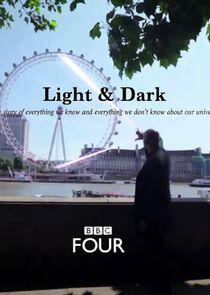Light and Dark - Season 1

Season 1
Two-part series in which Professor Jim Al-Khalili shows how, by uncovering its secrets, scientists have used light to reveal almost everything we know about the universe. But in the last 30 years we have discovered that far from seeing everything, we have seen virtually nothing. Our best estimate is that more than 99 per cent of the universe is actually hidden in the dark.

Episodes

Light
The story of how we used light to reveal the cosmos begins in the 3rd century BC when, by trying to understand the tricks of perspective, the Greek mathematician Euclid discovered that light travels in straight lines, a discovery that meant that if we could change its path we could change how we see the world. In Renaissance Italy 2,000 years later, Galileo Galilei did just that by using the lenses of his simple telescope to reveal our true place in the cosmos.
With each new insight into the nature of light came a fresh understanding of the cosmos. It has allowed us to peer deep into space and even revealed the composition and lifecycles of the stars.
In the 1670s, the Danish astronomer Ole Roemer discovered that light travelled at a finite speed, a discovery that had a profound implication. It meant the further one looks out into the universe, the further one looks back in time. And in 1964, by detecting the cosmic microwave background, the afterglow of the big bang, we captured the oldest light in the universe and saw as far back as it is possible to see with light.

Dark
The first hints that there might be more out there than meets the eye emerged from the gloom in 1846 with the discovery of the planet Neptune. It was hard to find, because at four billion kilometres from the sun there was precious little light to illuminate it and, like 89 per cent of all the atoms in the universe, it gives off almost no light.
In the middle of the 20th century scientists discovered something even stranger - dark matter - stuff that wasn't just unseen, it was fundamentally un-seeable. In fact, to explain how galaxies are held together and how they formed in the first place, there needed to be four times as much dark matter as there was normal atomic matter.
In the late 1990s scientists trying to measure precisely how much dark matter there was in the universe discovered something even more elusive out there - dark energy, a mysterious new force driving the universe apart that is thought to make up a colossal 73 per cent of it.
Finally, Jim explores the quest to uncover the nature of dark energy and to see dark matter pull the first stars and galaxies together, a quest that involves peering into the darkest period in the cosmos's past.
Recently Updated Shows

The Creep Tapes
Based on a collection of videotapes in the secret vault of the world's deadliest and most socially uncomfortable serial killer, who hires his victims to film him for the day under false pretenses, each episode exposes a new victim from one of the fabled 'Creep Tapes'.

America's Funniest Home Videos
ABC's longest-running primetime entertainment show, America's Funniest Home Videos, returns for season 36 this fall with the same mission -- giving families something genuinely funny to enjoy together on Sunday nights.
"AFV," the longest-running primetime entertainment show in ABC history, returns for season 36 with the same mission - to provide viewers with hysterical moments that fly by at a dizzying pace.

The Real Housewives of Potomac
Just up the river from our nation's capital lies a hidden gem—Potomac, Maryland. Its rolling hills, gated mansions, sophisticated prep schools, and exclusive country clubs all serve to keep the area invitation-only. Sprinkled throughout this community are a handful of old-line, wealthy African-American families who have historically broken racial barriers to provide a life of privilege for their children. The Real Housewives of Potomac follows the upscale lives of six intriguing, well-to-do women: Gizelle Bryant, Katie Rost, Karen Huger, Charrisse Jackson-Jordan, Robyn Dixon, and Ashley Darby, all of whom have fought for their places in this society by way of legacy or marriage. In a town where entry is granted only through class, pedigree, and lineage, how far will these ladies go to secure their spot at the top of this prestigious circle?

The Traitors Canada
Follow a group of contestants – including some familiar faces – who live together as they complete a series of challenges with the goal of earning a cash prize. The catch? Some of the contestants are traitors who will attempt to deceive and manipulate their way to the prize instead of sharing it amongst the group. In this psychological adventure will the traitors be unmasked in time?
